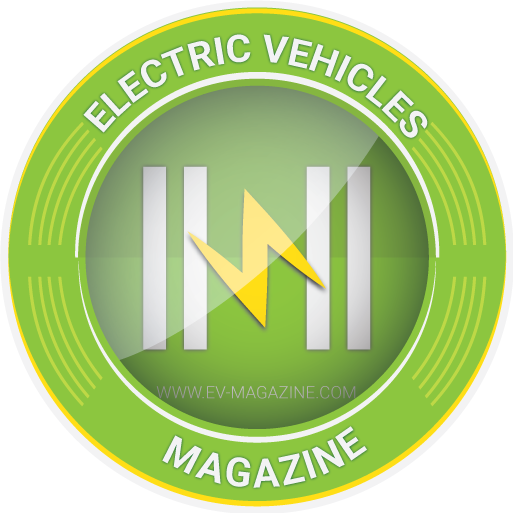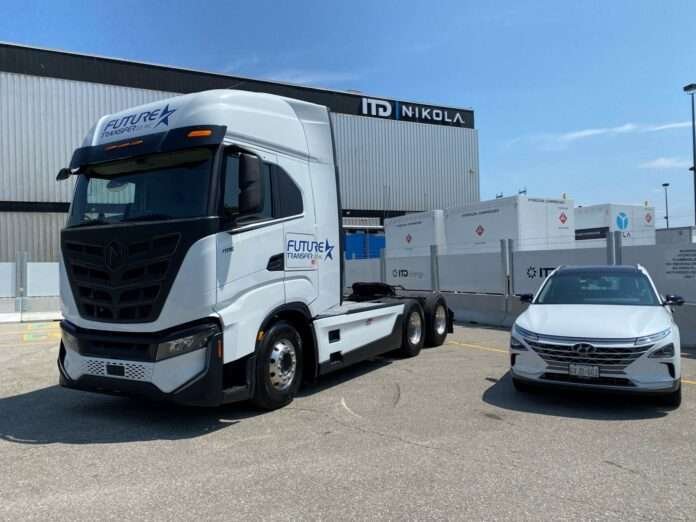The opening of Ontario’s first commercial fueling station for hydrogen-powered heavy trucks was celebrated July 30, during a ceremony attended by Premier Doug Ford.
ITD Industries and Nikola have constructed the permanent Hyla-branded station at ITD’s Etobicoke manufacturing facility, which also serves as Canada’s Nikola showroom. Nikola produces both battery-electric and hydrogen fuel-cell-electric trucks, and is the only Class 8 manufacturer to offer both options today, said Steve Girsky, Nikola CEO, who was also in attendance.
(Photo: James Menzies)
“It is inspiring to witness the vision of a hydrogen-powered future coming to life with the opening of this refueling station in the Greater Toronto Area,” Girsky said. “Collaborating with ITD Industries, we are not only providing trucks but also the fueling solutions to support the entire hydrogen ecosystem. This station marks significant progress in our mission to build a comprehensive hydrogen infrastructure in North America.”
More stations to be built in the coming years
The station, located at 161 The West Mall, is situated close to Hwys. 401 and 427, as well as the Queen Elizabeth Way. Philip Turi, chief operating officer of ITD Industries, noted more stations will be built over the next two years, allowing hydrogen-fueled trucks to fill up along the Windsor-Montreal freight corridor.
“The presence of so many distinguished public and private figures, underlines and validates the importance of this station launch to the future of longhaul carbon-free commercial transportation,” he said during opening remarks. “This station is the first of several ITD is planning on erecting across Ontario with Nikola Corporation as we aim to build a hydrogen fueling corridor connecting Windsor to Montreal.”
The opening of the station also marks the launch of ITD Energy, a subsidiary of ITD Industries, which will own and operate the fueling stations. The station itself is capable of fueling at 700 bar, the benchmark for heavy-duty trucks, needed to provide fueling times comparable to diesel. Fueling time is one of the primary advantages for hydrogen trucks over battery-electric vehicles, which take hours to fully charge.
Premier Doug Ford helps ITD owner Benny Di Franco cut the ribbon to celebrate the opening of ITD’s first hydrogen filling station. (Photo: Krystyna Shchedrina)
Turi also noted hydrogen-fueled trucks have an advantage over battery-electric vehicles when it comes to range. He said the Nikola FCEV (fuel-cell-electric vehicles) have a range of more than 850 km. “The next nearest BEVs (battery-electric vehicles) are about 200 km less than that, so it’s substantial,” he added.
However, he noted the choice between FCEV and BEV will come down to customer preference and there will be a role for both to play in decarbonizing the transport industry.
“It’s hard for Nikola to be successful without being successful in Canada.”
Steve Girsky, Nikola CEO
Maike Althaus, executive director of Hydrogen Ontario, noted 10,000 heavy trucks emitting 3,000 tons of CO2 travel the 401 corridor every day.
Nikola sees Canada as a major market for its zero emissions vehicles.
“It’s hard for Nikola to be successful without being successful in Canada,” Girsky said. “It’s that important to us.”
Four Nikola fuel cell trucks were on display at the event, sporting liveries from early adopters including Walmart Canada, Canadian Tire, Loblaw, and Future Transfer. Girsky said Nikola has run some 3 million miles across its fleet of fuel cell trucks, preventing 4,700 metric tons of CO2 emissions, equal to removing 1,100 gas-powered cars from the roads annually.
He noted converting the heavy transport industry to zero emissions alternatives “is a huge problem,” noting there are 4 million diesel-fueled Class 8 trucks on the road across North America which consume 35-40 million gallons of diesel per year.
Premier Ford commended all the stakeholders who brought the opening of the fueling station to fruition and said Ontario supports development of a hydrogen fueling network.
“People are only going to buy these vehicles if they know that if they’re traveling on Hwy. 400, they’ll be able to fuel,” he said. “You and your teams are blazing a trail and we are going to be there to support you.”
Premier Doug Ford speaks at the opening of the station. (Photo: James Menzies)
Ford also noted decarbonizing transportation must occur while also expanding transport capacity to keep up with Ontario’s population and economic growth in the coming years. He touted the province’s energy grid as being “one of the cleanest grids in the entire world.”
Nikola pointed out in a related release that its trucks qualify for incentives under the federal Incentives for Medium- and Heavy-Duty Zero-Emission Vehicles (iMHZEV) program, which provides up to $200,000 toward the purchase of a Nikola fuel-cell-electric truck or $150,000 toward the acquisition of its battery-electric truck.
In B.C., that can be stacked atop a Clean BC Go Electric Rebate of up to $150,000 toward both versions.
Turi issued a call to action to attendees in the room, urging legislators to continue incentivizing the purchase of hydrogen-fueled trucks and hydrogen fuel itself. He also called for an increase in hydrogen fuel production to bring down costs to better align with the price of diesel. And he asked for financial support for the trucking industry to deploy zero-emission vehicles and train drivers on how to operate them.
“Today is about connecting the hydrogen, transport and energy communities,” he said. “We need you all talking about plans for investment in the future if this is going to work at scale.”
Walmart Canada, Loblaw and Canadian Tire are among the first Ontario customers of Nikola fuel-cell-electric trucks. (Photo: James Menzies)
Source link
#ITD #opens #Ontarios #commercial #hydrogen #fueling #station







